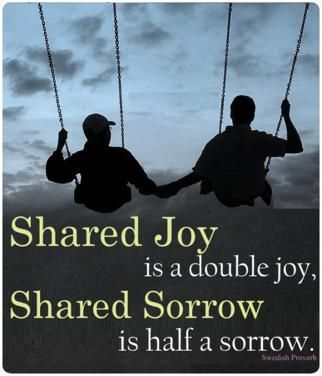Have you ever noticed how experiences feel richer when you share them with others? Picture this: you’ve just achieved something significant, maybe you got a promotion or completed a marathon. When you tell your friends and see their faces light up, doesn’t that joy feel amplified? On the flip side, when life throws curveballs, sharing your troubles with someone often makes the burden lighter. Why is that? Let’s delve into this beautiful aspect of human connection and understand why shared joy is a double joy, and shared sorrow is half sorrow.
The Magic of Shared Experiences
Human beings are inherently social creatures. Our joys and sorrows are deeply intertwined with our relationships. When we celebrate a win, sharing it with friends and family can make the joy feel even more profound. Imagine hosting a party after a promotion. The laughter, the toasts, the shared excitement all enhance the feeling of achievement. This phenomenon is not just emotional but also psychological. Studies have shown that sharing positive experiences can increase overall happiness and well-being. The science behind it points to the release of endorphins and the strengthening of social bonds.
Joy Multiplied Through Sharing
Why does joy double when shared? It’s simple. When you share your happiness with others, you not only experience your joy but also witness the joy of those you share it with. This creates a feedback loop of positivity. Think about the last time you watched a funny movie alone. Now, remember watching it with friends. The laughter becomes infectious, the jokes seem funnier, and the entire experience more enjoyable. Sharing joy with others creates moments of connection that become treasured memories, adding layers to our initial happiness.
The Support System in Sorrow
Conversely, when sorrow is shared, it feels more manageable. The phrase “shared sorrow is half sorrow” captures this perfectly. When facing difficult times, opening up to someone can provide immense relief. Talking about our troubles helps us process emotions, gain perspective, and feel supported. Friends and family often provide comfort, advice, or simply a listening ear. This support can significantly alleviate feelings of loneliness and despair. It’s not about having someone solve our problems, but about knowing we don’t have to face them alone.
Empathy and Connection
Empathy plays a crucial role in this dynamic. When we share our joy, others’ empathy allows them to celebrate with us genuinely. Similarly, when we share our sorrow, their empathy helps them understand and share our pain, even if they haven’t experienced it themselves. This mutual understanding fosters deeper connections and strengthens relationships. It’s a beautiful cycle where shared emotions, whether joyous or sorrowful, bring people closer together.
Building Stronger Bonds
Sharing emotions can fortify our relationships. Celebrating each other’s successes and supporting each other’s struggles builds trust and intimacy. When friends and family are genuinely involved in our lives, it creates a network of support and love. These bonds are essential for our mental and emotional health. They provide a sense of belonging and security, knowing there are people who care about us unconditionally.
Practical Ways to Share
How can we incorporate more sharing into our lives? It doesn’t have to be grand gestures. Simple acts can have profound impacts. For instance, making a phone call to share good news, inviting friends over for a casual celebration, or simply listening to someone’s woes without judgment. Social media also plays a role in modern sharing. Posting a happy moment can invite congratulatory messages that enhance the joy, while sharing struggles can bring in supportive comments and advice. However, personal interactions often have a deeper impact than digital ones.
Overcoming Barriers
Sometimes, sharing our emotions can be challenging. We might fear judgment, rejection, or feel like a burden. It’s important to remember that everyone experiences highs and lows, and most people appreciate being included in others’ lives. Vulnerability can be a strength, allowing for genuine connections. By opening up, we give others the chance to be there for us, just as we would for them.
The Power of Listening
Equally important as sharing our own emotions is being there for others. Listening actively and empathetically when someone shares their joy or sorrow can make a world of difference. It shows we care and value their experiences. Sometimes, people just need to be heard. Offering a sympathetic ear can provide comfort and validation, reinforcing the shared experience’s emotional benefits.
Shared Joy and Sorrow in Community
Communities thrive on shared experiences. Whether it’s a neighborhood coming together for a block party or rallying around a family in need, these collective actions create a sense of unity and shared purpose. Community support can magnify joy and distribute the weight of sorrow across many shoulders, making it easier for individuals to bear. This collective empathy strengthens the social fabric, making communities more resilient and cohesive.
Personal Growth Through Sharing
Finally, sharing our emotions can lead to personal growth. Expressing joy allows us to reflect on our achievements and appreciate them fully. Sharing sorrow can help us process and learn from difficult experiences. Both aspects foster emotional intelligence, resilience, and a deeper understanding of ourselves and others. By engaging in this mutual exchange of emotions, we not only enhance our well-being but also contribute positively to the lives of those around us.
Conclusion
In essence, the adage “shared joy is a double joy; shared sorrow is half sorrow” encapsulates a profound truth about human relationships. Our lives are enriched when we connect with others, sharing both the highs and lows. This exchange of emotions strengthens bonds, builds community, and promotes personal growth. So, next time you have something to celebrate or a burden to share, reach out. Let the people in your life be part of your journey. You’ll find that joy is sweeter and sorrow is more bearable when shared.
FAQS ChatGPT
FAQs: Shared Joy is a Double Joy; Shared Sorrow is Half Sorrow
What does the phrase “shared joy is a double joy; shared sorrow is half sorrow” mean?
The phrase means that when you share your happiness with others, it feels even greater, and when you share your troubles, the burden feels lighter. This highlights the importance of social connections in enhancing positive experiences and alleviating negative ones.
How does sharing joy enhance the experience?
When you share joy with others, their reactions and shared excitement amplify your own feelings of happiness. It creates a positive feedback loop, making the experience more memorable and fulfilling. Celebrating together strengthens bonds and creates a sense of community.
Why does sharing sorrow make it more bearable?
Sharing sorrow allows you to express your feelings and receive support. It helps in processing emotions and gaining perspective. The empathy and comfort from others can reduce feelings of isolation and provide relief, making the emotional burden easier to manage.
Can sharing emotions improve mental health?
Yes, sharing emotions can significantly improve mental health. It helps in releasing built-up stress and provides emotional support. Positive interactions enhance mood and well-being, while sharing difficulties can prevent feelings of loneliness and despair.
How can I share my joy or sorrow with others?
You can share joy or sorrow through simple actions like calling a friend, meeting loved ones, or posting on social media. Face-to-face interactions often have a deeper impact. Celebrating successes and discussing challenges in person can create stronger emotional connections.
What if I’m afraid of being judged when sharing my emotions?
It’s natural to fear judgment, but remember that most people value genuine connections. Vulnerability can strengthen relationships and show trust. Start by sharing with those you feel closest to and gradually expand your circle of trust.
How can I support someone who shares their emotions with me?
Listen actively and empathetically. Acknowledge their feelings without judgment and offer comfort. Celebrating their successes and providing a listening ear during tough times can make a significant difference in their emotional well-being.
Does sharing emotions help in building stronger relationships?
Absolutely. Sharing both positive and negative experiences builds trust and intimacy. It shows that you care and are invested in each other’s lives, which strengthens the bond and creates a supportive network.
Can communities benefit from shared experiences?
Yes, communities thrive on shared experiences. Collective celebrations and support during difficult times foster a sense of unity and belonging. This strengthens the social fabric, making communities more resilient and connected.
How can sharing emotions lead to personal growth?
Expressing joy allows you to reflect on and appreciate your achievements fully. Sharing sorrow helps in processing and learning from difficult experiences. Both contribute to emotional intelligence, resilience, and a deeper understanding of oneself and others.
What are some practical tips for sharing emotions effectively?
- Be Genuine: Share your true feelings to create authentic connections.
- Choose the Right Time: Find appropriate moments to share, ensuring the other person can be fully present.
- Be Open to Receiving Support: Allow others to comfort and support you.
- Practice Active Listening: When others share with you, listen without interrupting and show empathy.
- Express Gratitude: Acknowledge and thank those who share in your joy or support you in sorrow.
Is it possible to overshare?
While sharing is beneficial, it’s important to balance and respect boundaries. Oversharing can overwhelm others or make them uncomfortable. Be mindful of the context and the depth of your relationship with the person you’re sharing with.
Shared Joy is a Double Joy



